"From the top down, Duke has built a program that values their trainees and puts a premium on their growth, education, and well-being."
Maxine Chan, MD, Class of 2024
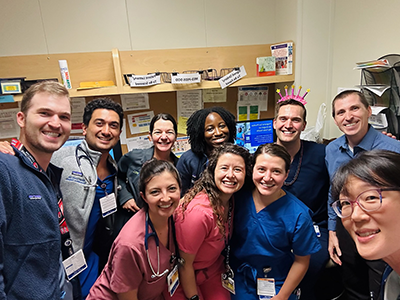
Medicine-Pediatric residents are regarded as categorical residents by both departments. Because Medicine-Pediatrics residents bring a special wealth of knowledge to both departments, their expertise is valued.
We have a “x+y” scheduling format, with 4 weeks of mostly inpatient rotations followed by 2 weeks of mostly ambulatory rotations. Continuity clinic, described below, is scheduled during y-block rotations, with 6 clinical sessions (half-days) per 2 weeks of a rotation. Occasionally, continuity clinic is scheduled on an elective rotation in an x-block.
Internship
Intern year is 12 months in duration and is divided into four, three-month blocks on internal medicine and pediatrics. Although specific rotations may vary from year to year, a special effort is made to provide residents with an effective balance of intensive care, ambulatory, and inpatient ward experience.
Pediatric rotations include:
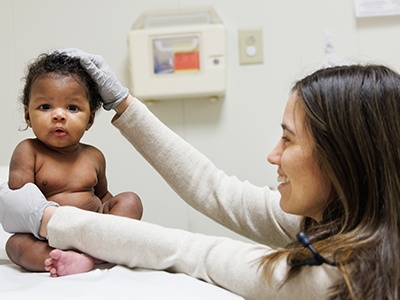
- 8 weeks of general inpatient pediatrics,
- 4 weeks of neonatal intensive care,
- 4 weeks of newborn nursery,
- 2-3weeks of pediatric subspecialty elective
- 2 weeks of pediatrics same day clinic (acute ambulatory care),
- 2-3 weeks of pediatric community rotation
Medicine rotations include:
- 8 weeks of General inpatient medicine (Duke University Hospital and VA),
- 6 weeks of subspecialty rotations (Hematology/Oncology and Cardiology),
- 3-4 weeks of geriatric medicine,
- 2 weeks of cardiac intensive care unit,
- 2 weeks of adult community rotation,
- 2 weeks of an elective subspecialty
Second and Third Years
These two years are categorized as junior residency. Residents continue to rotate between medicine and pediatrics every three months to maintain a continuity of experience and proficiency in both disciplines. The experience in each department is very similar to that offered to the categorical medicine and pediatric residents to achieve board eligibility. The rotations include inpatient wards, intensive care units, electives, ambulatory clinics, the local federally qualified health center (FQHC) both on medicine and pediatrics, and emergency department experiences.
Fourth Year
Medicine experiences consist of an inpatient supervisory general medicine rotation at Duke Regional Hospital (DRH), inpatient specialty electives, an intensive care month, and an emergency medicine acute care rotation. The pediatric portion of the schedule includes six one-month rotations with electives and inpatient experiences at Duke and an option at WakeMed in Raleigh.
View a sample of the Duke Medicine-Pediatrics Residency Program four-year curriculum
Combined Medicine-Pediatrics Continuity Clinic
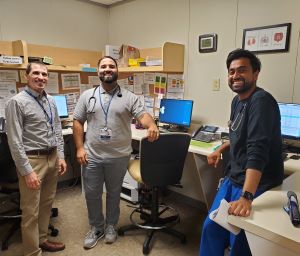
Our residents have a combined medicine and pediatric clinic, staffed exclusively by combined medicine-pediatrics faculty preceptors. Residents have a balanced outpatient experience of acute, return, and new visits (including newborns), and see approximately 50% pediatric and 50% adult patients in each session.
The clinic is strategically placed within the North Durham community and on a bus route; it is approximately a 10-minute drive from the main hospital in the Duke Medical Plaza on North Duke Street. It is an integrated office building with med-peds resident and faculty clinics, as well as general pediatrics resident and faculty practice. The clinic is a primary care medical home accredited by the Joint Commission, serving patients with complex medical issues and social needs. The clinic has on-site social work, nurse clinicians, lactation consultants, lab services, pediatric clinical psychologist, laboratory services, and physical therapy. There are on-site Spanish interpreters as well as video interpreters for all other languages. In addition, we benefit from sharing clinical space with Healthy Lifestyles (child nutrition and weight management clinic), adolescent medicine, pediatric mental health, and child abuse and foster care clinics. Residents are trained in telemedicine and conduct patient visits via telehealth according to need.
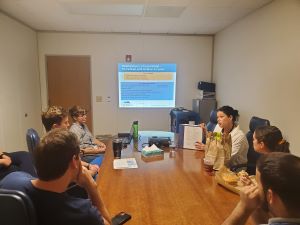
Pre-clinic conferences on ambulatory topics in both medicine and pediatrics are held at and during continuity clinic. Conferences are a collaborative experience with residents and faculty, and provide residents an opportunity for peer-teaching.
Pre-clinic conferences on ambulatory topics in both medicine and pediatrics are held weekly. Conferences are a collaborative experience with residents and faculty, and include health equity and justice topics.
“I LOVE our clinic. We have excellent faculty and staff. I'm so proud of the resources we are able to provide for our patients.”
Med-Peds Resident, 2025
“I was looking for a program with my best interests at heart. One that could set me up for fellowship training in any field. Great strengths [of the program are] a world renown medicine institution as well as a place with who truly takes care of the NC community.”
Shane Clark, MD, PGY-4
Unique Opportunities
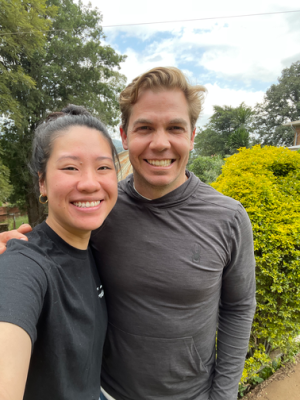
Global Health: Resident may apply for an 8-week global health rotation, incorporating 4 weeks of medicine and 4 weeks of pediatrics at the same site. Residents also participate in a global health curriculum in preparation for overseas clinical care. Global Health sites include Kenya, Tanzania, Peru, Sri Lanka, China, Thailand, Indian Health Services in New Mexico, and Australia. Read more about Global Health at Duke.
Federally-Qualified Health Center: Residents spend a total of 8 weeks at Lincoln Community Health Center, split between medicine and pediatrics. Residents can also volunteer here for evening shifts.
Medical Education and Leadership Track (MELT): MELT provides comprehensive training in clinical teaching and medical education scholarship through 13 interactive workshops spanning 12 months, available to all residency programs.
Health Equity and Advocacy Leadership Track (HEAL): The HEAL track is designed to equip our residents to become leaders in advocacy and health equity to reduce health disparities, and is available to Pediatrics and Med-Peds residents. It includes didactics and an advocacy project, in addition to expert mentorship.
Adult and Pediatrics Community Rotations: During intern year, residents have the opportunity to learn about community resources for their patients in the ambulatory setting. The rotations include learning of various community programs and advocacy organizations, support groups, and clinical experiences with opioid use disorder and tuberculosis. They are also opportunities to learn about the history of Durham, population health resources, and more.
Med-Peds Ambulatory Rotation (with Transition Curriculum): This rotation, 3-4 weeks in both the PGY-2 and PGY-3 years, utilizes didactic podcasts and clinical application activities in order to learn key aspects of transition from pediatric to adult-oriented care. Clinical experiences include rotating in transition-focused clinics such as pediatric complex care clinic, adult congenital heart clinic, hematology/sickle cell clinic, dermatology, and rheumatology. The curriculum also incorporates assessment of transitions by residents of their own clinic population by focusing on health maintenance and other needs of their adolescent and young adult patients.
In addition to the above rotations, our residents may participate in the Comprehensive Introduction to Research Course elective, dedicated procedure electives, simulation training, and an integrated Evidence-Based Practice curriculum.
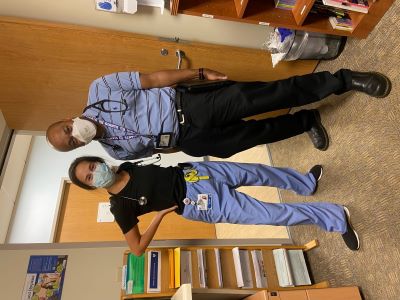
Combined Med-Peds Conferences
In addition to the categorical residency program conference, Medicine, Pediatrics and Medicine-Pediatrics residents have the opportunity to attend combined Medicine-Pediatrics conferences eight times per year. Speakers include the fourth-year med-peds residents giving their senior talks and other faculty speakers who cover topics relevant to internal medicine, pediatrics, and med-peds trainees.
Scholarly Activities
Medicine-Pediatric residents often participate in a wide variety of additional scholarly activities during their training. Many have the opportunity to present their research at meetings and represent Duke at conferences. View examples of some of the recent scholarly accomplishments of our Medicine-Pediatrics residents.
Latest Med-Peds News
Take a look at the latest Med-Peds Newsletters for information on incoming trainees, program graduates and highlights and accomplishments.